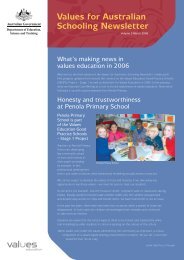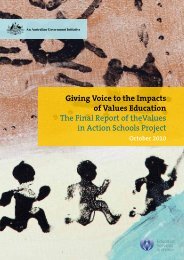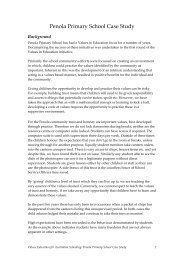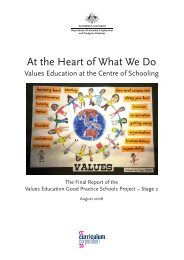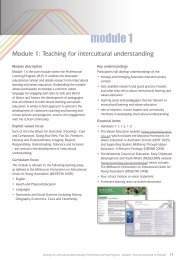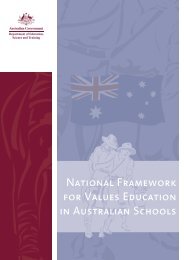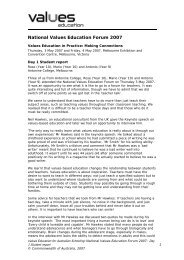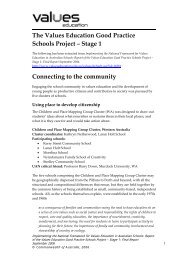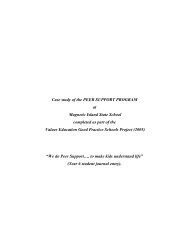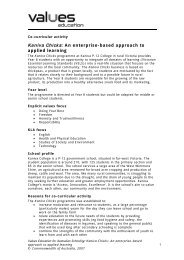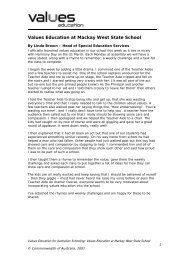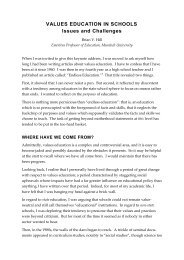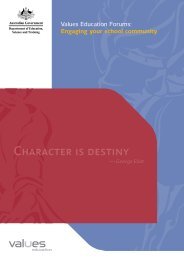Giving Voice to the Impacts of Values Education The Final Report of ...
Giving Voice to the Impacts of Values Education The Final Report of ...
Giving Voice to the Impacts of Values Education The Final Report of ...
Create successful ePaper yourself
Turn your PDF publications into a flip-book with our unique Google optimized e-Paper software.
I found myself. I became different in a way I can’t explain – but good. (Student reflection, University<br />
Advisor’s report, Beenleigh Cluster)<br />
I learned how <strong>to</strong> trust people, not be scared. I believe in myself now. (Student reflection, University Advisor’s<br />
report, Beenleigh Cluster)<br />
<strong>The</strong> process <strong>of</strong> self-discovery and self-knowing is important <strong>to</strong> all students, but findings from <strong>the</strong> VASP<br />
suggest that this is especially <strong>the</strong> case for students who are ‘at risk’, marginalised or disadvantaged. <strong>The</strong><br />
power <strong>of</strong> this finding is demonstrated in <strong>the</strong> heartfelt and insightful written reflection <strong>of</strong> a male student in<br />
a detention centre: ‘My advice <strong>to</strong> new boys that come in<strong>to</strong> [institution] is <strong>to</strong> RESPECT myself and o<strong>the</strong>rs. Stay<br />
strong and keep your head up. Look <strong>to</strong>wards <strong>the</strong> future and want better for yourself and your friends and<br />
family. You only have ONE life and ONE life ONLY – treasure everything that you have in your life.’<br />
O<strong>the</strong>r data from <strong>the</strong> Australian Juvenile Detention Centres School Cluster streng<strong>the</strong>ns this finding.<br />
Results from a Personal Wellbeing Index (Cummins 2006) highlight a growth in students’ understanding <strong>of</strong><br />
wellbeing and its significance <strong>to</strong> <strong>the</strong>ir lives. <strong>The</strong>se results suggest that through <strong>the</strong>ir close examination <strong>of</strong><br />
values and, in particular, <strong>the</strong>ir focus on giving <strong>to</strong> o<strong>the</strong>rs, many students showed an increased awareness <strong>of</strong><br />
<strong>the</strong>mselves and <strong>the</strong>ir place in <strong>the</strong> world.<br />
<strong>The</strong>re is also evidence that shows changes in students’ understanding <strong>of</strong> <strong>the</strong> impact <strong>of</strong> <strong>the</strong>ir actions on <strong>the</strong><br />
wellbeing <strong>of</strong> o<strong>the</strong>rs, as seen in <strong>the</strong> following data excerpts. <strong>The</strong> first is a teacher’s description <strong>of</strong> <strong>the</strong> way that<br />
students now value difference, and how students, previously marginalised, have experienced acceptance<br />
and self-worth:<br />
<strong>The</strong>re has also been a change in <strong>the</strong> way individuals in <strong>the</strong> class are valued. <strong>The</strong>re are children from<br />
different cultural and racial backgrounds in <strong>the</strong> class, as well as an integrated child with a physical<br />
disability, and a child who has struggled <strong>to</strong> find acceptance by peer groups. All <strong>of</strong> <strong>the</strong>se children have<br />
benefited from <strong>the</strong> values program. While in <strong>the</strong> early days <strong>the</strong>se children needed <strong>to</strong> be placed in groups<br />
by <strong>the</strong> teacher, <strong>the</strong>y are now <strong>of</strong>ten selected by o<strong>the</strong>rs. In some cases <strong>the</strong>se children have gone from being<br />
almost invisible in <strong>the</strong> classroom <strong>to</strong> being chosen as peer tu<strong>to</strong>rs and <strong>the</strong>ir talents acknowledged and valued.<br />
This has improved <strong>the</strong>ir confidence and self-esteem, leading <strong>to</strong> improved educational outcomes. (Teacher<br />
MSC s<strong>to</strong>ry, Catholic Schools <strong>of</strong> <strong>the</strong> Clarence)<br />
<strong>The</strong> o<strong>the</strong>r s<strong>to</strong>ry excerpts, from students, illustrate <strong>the</strong>ir awareness <strong>of</strong> <strong>the</strong> role <strong>the</strong>y play in enhancing <strong>the</strong><br />
wellbeing <strong>of</strong> o<strong>the</strong>rs:<br />
Well, in our classroom, we used <strong>to</strong> be quite crazy, like when we got a pile <strong>of</strong> sheets everyone would grab<br />
<strong>the</strong>m and have a fight over what sheet but now we’re starting <strong>to</strong> respect each o<strong>the</strong>r more and like a person<br />
will get two sheets and hand <strong>the</strong>m out <strong>to</strong> people and we’re waiting our turn in grabbing things, and we’re<br />
sharing stuff. Like if someone’s lost <strong>the</strong>ir pencil or something you’d be ‘oh, you can borrow mine, it’s okay,<br />
it doesn’t matter’ and things like that. And we’ve changed a bit more, like we’re all calmer, like we’re all<br />
spending more time listening <strong>to</strong> each o<strong>the</strong>r and respecting each o<strong>the</strong>r’s opinions. (Student MSC s<strong>to</strong>ry,<br />
Palmers<strong>to</strong>n Cluster)<br />
Section 2: <strong>Impacts</strong> <strong>of</strong> <strong>the</strong> <strong>Values</strong> in Action Schools Project<br />
51



